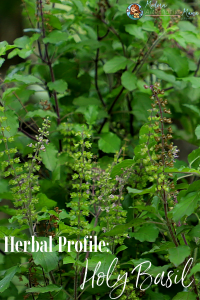By Sarena-Rae Santos, Contributing Writer
What is Holy Basil
Holy basil, often referred to as tulsi or its scientific name, Ocimum tenuiflorum, is a relative of traditional basil and a part of the mint family. In Hinduism, holy basil is considered sacred (1). Its glossy, oval-shaped leaves with smooth or slightly toothed edges can identify this adaptogenic herb. The leaves are attached to square stems with clusters of small flowers ranging from white to magenta (2).
Health Benefits of Holy Basil
The leaves, stem, flower, root, seeds, and oil of holy basil are all used in Indian medicine to heal the body, mind, and spirit. Some of the benefits of holy basil include the following:
Rich in Nutrients
Our body needs nutrients to flourish. Without vital vitamins and minerals, our bodies won’t function properly. Holy basil contains vital nutrients, including magnesium, manganese, copper, folate, iron, calcium, and vitamins A, C, and K (3).
Antimicrobial Properties
An antimicrobial property is when a substance, or in this case, an herb, can kill or suppress the spread of microorganisms such as bacteria, viruses, protozoans, and fungi (4). One study found holy basil inhibited all bacterial strains tested in vitro (5). Another study found holy basil essential oil was effective against S. aureus (including MRSA) and E. coli but only partially effective against P. aeruginosa (6).
Antifungal Properties
An antifungal property is when a substance, or in this case, an herb, can fight the growth of specific pathogens that could harm your health, such as ringworm, athlete’s foot, tinea versicolor, toenail fungus, and jock itch (7). In vitro, holy basil demonstrated antifungal properties against C. albicans, although cinnamon and garlic performed better (8). Another study found concentrations of 0.015-0.03% or higher of holy basil demonstrated antifungal activity (9).
May Reduce Stress & Anxiety
Evidence suggests that acute and chronic stress is associated with increased inflammatory activity and how someone focuses on negative thoughts or events (10). If this is not taken care of, long-term and chronic inflammation can lead to many health complications, such as cancers, rheumatoid arthritis, atherosclerosis, heart disease, periodontitis, and much more (11). Of course, stress and anxiety usually go hand-in-hand.
Thankfully, holy basil’s adaptogenic properties may help. Holy basil’s pharmacological properties can help the mind cope with many types of stress. In animal studies, holy basil leaf extract enhanced metabolism, improved swimming time, less tissue damage, and lower stress levels in environment-induced stress/loud environments (12). Additionally, studies have found holy basil has anti-anxiety and depression properties comparable to pharmaceuticals like Diazepam (13).
May Lower Blood Sugar Levels
As of 2020, 34.2 million (1 in 10) Americans have diabetes, and another 88 million (1 in 3) Americans have prediabetes (14). On the bright side, studies have found holy basil to lower blood sugar levels. Early studies found holy basil extract decreased blood sugar levels by 26.4 percent after 30 days (15). In more recent animal and human studies, holy basil prevented diabetic symptoms such as weight gain, hyperinsulinemia (excess insulin in the blood), high cholesterol, insulin resistance, and hypertension (16,12).
May Lower Cholesterol Levels
Heart disease is the world’s number 1 cause of death (17). Due to the incredibly complex determinants of heart disease and various possible contributions, it’s hard to pinpoint an exact way to prevent it. Still, you can at least lower your overall risk by controlling your cholesterol levels.
An overview of research and clinical indications noted holy basil could lower LDL “bad” cholesterol and increase HDL “good” cholesterol in rabbits. They also noted a reduction of cholesterol in the kidney, liver, or heart in rats. Additionally, the mentioned found holy basil also lowers stress-induced cholesterol levels (18)
Safety Concerns
According to mainstream sources, holy basil should be avoided during pregnancy or while trying to conceive due to the possibility of uterus contractions (19). Of course, as per usual, there is no evidence to these claims. I searched online for instances of uterus contractions, to be met with none.
Interestingly, according to Dr. Scott Gerson, tulsi is often used in Ayurvedic medicine during the seventh month of pregnancy when the abdominal skin becomes stretched, resulting in itching and striations (20).
In conclusion, if there is no evidence that it has caused harm, and everything claimed is speculation, I am confident it is safe to use. Trust your instincts if you are trying to get or are pregnant. Every mom feels different because every mom is different; if your gut is telling you to pass on holy basil, it’s best to do so.
How to Use Holy Basil
You can find holy basil in dried bulk, pills, powders, teas, extracts, or tinctures. Tinctures always contain the most concentrated amount of herbs. Teas and soups are also options, especially when following Ayurvedic medicine recipes. Some great articles to check out featuring the use of holy basil include:
Follow the recommendations of any supplement; some of my recommendations include:
- Earthley’s Anxiety Calm Oil (Formula A) is formulated with adaptogenic herbs, a blend of organic hemp seed oil, and organic herbs (lavender, lemon balm, holy basil) to provide support without CBD.
- Earthley’s Anxiety Calm Oil (Formula C) is a CBD oil formulated with 600 mg of pure-spectrum CBD in a hemp seed oil base while also being infused with organic herbs (lavender, lemon balm, holy basil) to provide a rich blend of cannabinoids and terpenes, to create the most synergistic benefits.


